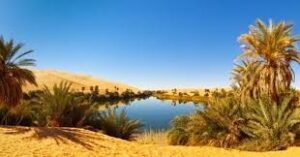When They Came to Marah
the Water was Bitter
15: 22-26
When they came to Marah the water was bitter DIG: How can these people turn from prison to praise to protest so quickly? What is the essence of their complaint and God’s cure? Why hadn’t He led Isra’el to sweeter water in the first place? What does that say about our patience? God’s provision? His discipline?
REFLECT: What is your sweet and sour experience this year? Most importantly, how are you reacting to it? Are you most open to the Lord’s leading in feast or in famine? Are you in the desert right now? What does the Bible have to say about our complaining to Christ (First Corinthians 10:10)?
Then Moses led Isra’el from the Red Sea and they went into the Desert of Shur located east of Egypt (Genesis 25:18, First Samuel 15:7) in the northwestern part of Sinai. This desert separates Egypt from Palestine. The same area is called the Desert of Etham in Numbers 33:8. Shur and Etham mean fortress wall, Shur being the Hebrew word and Etham its Egyptian equivalent (15:22a). The first important stop they came to was Marah, which means bitterness, (and is the same root that the name Mary, the mother of Jesus, comes from). Many believe that it can be identified with modern Ain Hawarah, east of the Gulf of Suez about fifty miles south of its northern end, but in reality its exact location is unknown.
It is only after we are saved that we become aware that this world can be a barren and desolate desert to us. To the natural man and woman there is much to be desired in this world. However the eye of faith sees nothing but death written across the entire scene. So far as the spiritual life is concerned, the world is simply a desert. It is a place for travelers. But believers understand this is not their home; they are looking forward to the New Jerusalem, the city with foundations, whose architect and builder is God (Hebrews 11:10). Consequently, they are aliens and strangers on the earth (Hebrews 11:13). It is in this sense that believers are in a desert.290

With light hearts the Israelites begin their journey, but they were not prepared for what lay before them. To go three days in the desert without finding water and when they reached some, to find it bitter! Oh, the disappointment. That is why the place is called Marah (15:22b-23). They had expected much more from God! So, too, is it with young believers. They have peace with God and rejoice in the know-ledge that their sins are forgiven. But they do not (nor did we) anticipate the troubles that lay before them. Did we not think that things would now go smoothly? Have we not been disappointed and discouraged when we found no water, or that it was bitter, in this life?
So the people complained to Moses because they were looking at their circumstances and not to God. In doing so they set in motion a pattern that would be repeated whenever they faced a crisis (Exodus 16:2-3, 17:2-3, Numbers 11:4-6, 14:1-4, 16:11-14, 20:2-5). But it is important to note that their complaining was not merely an expression of disgruntled complaint. No, it was much more than that. It was open rebellion, and their rebellion was not against Moses and Aaron alone, but against God as well (Psalm 106:25). They said: What are we to drink (15:24)? Their lack of faith was startling in light of their recent songs of deliverance and worship. They were blessed so much, yet when adversity came they quickly reverted to their complaining ways. But, then again, let us not judge them too harshly, because how much like the Israelites we are!291
As believers in Jesus, we should learn an important lesson from this. When we first realize that Satan’s power over us is broken forever, that we are born of the Spirit, and as God’s children, we are to live forever with Him, our hearts are filled with praise and thanksgiving. But as the days go by, and we travel in life’s journey, meeting trials, disappointments and difficulties that come to every one of us; we forget that Christ is with us to supply all our needs. We get our eyes fixed on the discomforts along the way, and only too often we grow discouraged and grumble. We all have our Marahs. We cannot bypass them, detour around them, skip over them or tunnel under them. But how much better it would be to go forward with our eyes fixed on God instead of our problems? 292
The sight of water that was undrinkable depressed the people greatly. However, as they grumbled, Moses sought God in prayer. Then Moses cried out to ADONAI, and ADONAI showed him a branch of a tree. He threw it into the water, and the water became sweet (15:25). The lesson seems to have been that the people of Isra’el were totally dependent upon God for their survival. They needed divine assistance, apart from which, they would surely die.293 Thus, we should always remember that no matter how bitter the experiences of this life are, if we put the Branch (Isa 4:2, 11:1, Jer 23:5, 33:15), or Yeshua in the middle of it, the bitterness will disappear. There is no disappointment in life so bitter that Messiah cannot sweeten it.294
Long before Moses was given the Torah on Mount Sinai, the Israelites were expected to keep ADONAI’s commands, decrees and requirements given to them at various times (Genesis 26:5), and to conduct themselves in ways that were right and just (Genesis 18:19). It should therefore not be surprising that God would demand obedience to His commands and decrees at Marah. This principle runs throughout the Bible and applies to every dispensation; blessing (not salvation) is dependent upon obedience.295
Then God gave the people a simple principle; obedience brings blessing and disobedience brings judgment.296 Moses said: If you listen carefully to the voice of ADONAI your God, obey and do what is right in His eyes, if you pay attention to His commands and keep all His decrees, I will not bring on you any of the diseases I brought on the Egyptians with the plagues, for I am ADONAI your healer (15:26). The healing of the waters of Marah, together with the promise of continued good health for His people, was the occasion for God to reveal one of His many attributes by combining the personal name ADONAI with another element, in this case, ADONAI your healer (Isaiah 19:22, Hosea 6:1 and 11:3).297

The people of Isra’el were spiritual children in the wilderness. Like many spiritual children, they were very immature. When people come to Yeshua Messiah at the beginning of their walk with Him, many times they think everything is going to be perfect. Then they discover that they are still in the world, grumbling and complaining when things don’t go their way. Yeshua said: In this world you will have trouble. But take heart! I have overcome the world (John 16:33). That is what this trip is all about for the people of Isra’el, learning that they could rely on God, rather than themselves. Their lesson then is our lesson today.



Leave A Comment